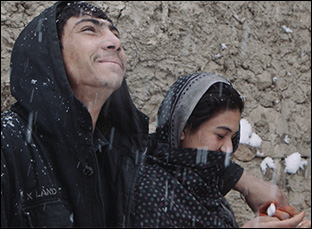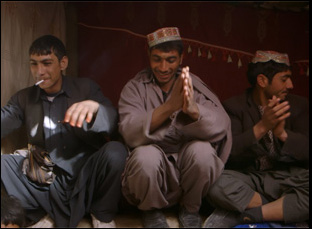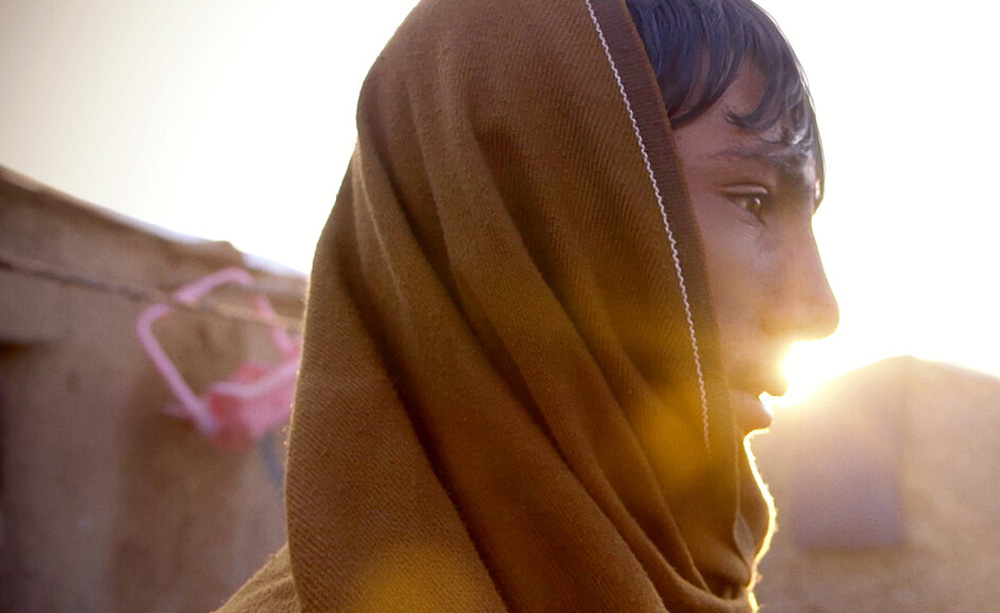“What can I do with you, Afghanistan?” a young man named Shaista says as he’s pulling bricks out of the molds he’s created to hopefully sell to scrounge up some cash in “Three Songs for Benazir.” He shows a good humor about the situation he’s found himself in with his family now taking up residence at a camp for those displaced by war in Kabul, and is well aware of how those outside could see him, joking as he tears into a piece of bread for lunch to break a fast, “I will carry out a suicide attack on this food.” Well aware that the world is watching – he only needs to look up at the sky where camera-carrying zeppelins are conducting surveillance on the camp – Shaista can’t possibly know about the life in front of him holds, doing what he can with what limited opportunities there are to take care of his loved ones, performing odd jobs for financial sustenance and offering to sing for his wife Benazir, who is pregnant with their first child, for her comfort.
Over nearly ten years, Elizabeth and Gulistan Mirzaei would visit Shaista at the camp, observing him navigate an uncertain future while making life the best he can for everyone around him and the result, “Three Songs for Benazir,” is both heartwarming and heartbreaking as a profile of someone who has so few takers for all he is willing to give, struggling through poverty and emboldened by being forced to leave his home of Helmand when he was in the third grade to want to fight against the Taliban, though his father ultimately forbids him from joining the army when there are more pressing needs to keep the family afloat. Although his desires are entirely selfless, the Mirzaeis capture the push and pull between how Shaista can serve others and what he actually wants for himself, driven by the love he has for Benazir and surely a better life for the new baby they’re bringing into the world and while the Mirazeis let the specter of war recede into the background, the internal conflict that exists in its wake is brought to the surface vividly. With the film now streaming on Netflix after being shortlisted for Best Documentary Short for this year’s Oscars, the Mirzaeis and Omar Mullick, the co-director of “These Birds Walk” who came aboard as one of the film’s producers, spoke about how they went about creating such an uncommon and tender look at life in Afghanistan, distilling a decade’s worth of work into a 22-minute short and the trust they built with their subjects.

Elizabeth Mirzaei: We were distributing food at the time — rice, dry goods and things like that and we saw a lot of people and in the middle of all this chaos of the camp, there are people just gathered for the distribution and we meet this teenager named Shaista, who we just felt this really immediate connection with. Even at that time and we saw how there was something very compelling and special about him — the wonder, the curiosity that he was reciting poetry to us, and we became very good friends with him over time. Gulistan brought him to a swimming pool for the first time and he’d never been in a pool in his life. He brought him horseback riding and over time, we just really got to know him and Benazir and ultimately several years after our friendship started, we started making this film.
Gulistan Mirzaei: I work with many foreign journalists in Afghanistan. A lot of them didn’t know my language, my culture, but I do. As an Afghan filmmaker, it’s important for me to show my history of my country…
Elizabeth Mirzaei: Yeah, [Gulistan] had talked before about what he had not seen in the news and the way that the story was represented and misrepresented and the way the story was told over and over again. To counter that as an Afghan filmmaker, to tell the story of your own country is I think really part of this story of the film.
Omar, how did you get in the mix of this?
Omar Mullick: Well, they’d been trying to shake me off for so long now, but I just refused to go. laughs] But as a producer, you come on when things are in a nascent form and you try and be of some use. You’re something of a Swiss Army knife in that regard, and what hit me, even in its nascent form was this little miracle that’s embedded in the center of this 20-minute film that felt largely unprecedented. You’ve seen people try and I’ve been a part of efforts to constantly give this counter narrative with regard to Afghanistan and this region, and they pulled it off, which is a longwinded way of me saying just first and foremost, I’m a fan, just like you.
That perspective seems to contribute to the way even the film is shot where there isn’t much of the war. How did you think about context?
Elizabeth Mirzaei: That was one challenge also because we didn’t get a lot of establishing shots. There were things when we brought back, we realized oh we don’t have this, we don’t have that and we’re told these things were missing, but I lived in Afghanistan for eight years and obviously Gulistan is from there and the camp became a place that we had visited so many times, it just didn’t feel the need to constantly establish it. We wanted you to feel like you were in the middle of it and not an outsider looking in, so that informed a more intuitive way that I shot the film.
Was access to the camp a difficult process?
Gulistan Mirzaei: Yeah, most people can’t get access inside the camp, but because I’m Afghan, Elizabeth and I met him ten years ago and [with] friendship, I could go anywhere with the people inside the house, but the other people can’t.
Elizabeth Mirzaei: Also we spent a lot of time with people, not just Shaista but his family — we were there to bring Shaista’s niece to the hospital on several occasions and Gulistan and I accompanied some of the elders from the camp from Shaista’s tribe to meet at different ministries to talk about the building conditions there, so we had a long history between us before filming.
Did you always envision actually shooting over this period of time?
Elizabeth Mirzaei: When we started the film in 2013, we never actually thought it would take this long to finish, but we were living in Afghanistan full-time, so it wasn’t like we were coming and going. We would just visit the camp whenever we could every month over periods of years. And then we just stopped filming because I got pregnant with our first child, but we realized we were going back to Afghanistan anyway to visit family we just felt like let’s try to do some pick ups with Shaista. We couldn’t have imagined the kind of profound and really shattering consequences that we would witness as a result of the choices he had to make to build a life with Benazir.

Omar Mullick: No, I’ve been cheerfully framed in this corner of Afghanistan called Brooklyn. [laughs] But I hope if there’s some use I’ve been able to have on this, it’s actually to bring it to the finishing touch of a point of emphasis because it can very easily with the loud din of voices around you [where] you get lost. That this could become about, “Okay, the army, or poverty or this, or that.” Even with good intentions, you can lose that, even like the title of the film. So I’ve been cheerfully been a part of that and now, the greater focus for me has been just this excitable anxiety to get as many eyes on this as possible because it’s not what you think when you think about this region, and that is an amazing humbling thing to be able to say. It’s also important to say this is that the film isn’t being dropped into a neutral space. People have perceptions and I feel a pressure to make sure that people know going in they’ve not seen anything like this before.
The other really refreshing thing as both a producer and also a filmmaker who’s been in that region and other parts is what’s really astonishing about what these two have done is all the time I have a hand in projects that just shouldn’t be films. Maybe they should be a short, maybe it should be a podcast, or it should be an essay and they were in and out of there for 10 years and they distilled it down to the 20 minutes you see, [which] is an experience of such undiluted, experiential empathy, that by the end you’ve had a taste of a lifetime. That’s no small thing to pull off.
It works wonderfully as a short, but given the investment of time and resources, did you ever think it should be a feature?
Elizabeth Mirzaei: We honestly didn’t know. We were just shooting. We really thought that Shaista was going to be able to join the army, so we took that for granted in a sense that we assumed his family would sign for him, and we just kept following and saw how things developed, but always really keeping this beating heart of this love story between him and Benazir. We had other jobs in Afghanistan at the time freelancing. And then in between that, we would just go for a day at the camp and film with Shaista and then come out and a couple days later go back and visit him. So iwe kept building up footage in the story and not really knowing exactly where it was going, which is part of the wonderful magic and beauty of making documentaries. Until we really sat down with the footage, I’m not sure we had a clear idea of where it would go and we weren’t pitching the film anywhere, we just had it and we knew that what we got was something really rare. Even while we were filming it, we were aware of the uniqueness of the relationship and this story, so we just wanted to do whatever would do justice to the film. When we sat down, we just tried to get the real essentials of the story in it.
What’s it like seeing it get out in the world?
Gulistan Mirzaei: As an Afghan filmmaker, I’m really happy to be able to have my film on Netflix to get into the world like this and show that Afghans can themselves can make films. That’s part of it too, that as an Afghan filmmaker, there aren’t many. For us, having a global audience to the film at a time when it’s difficult to get stories out and to have this account of Shaista and Benazir will be really important for a global audience to understand the realities of Afghanistan.




